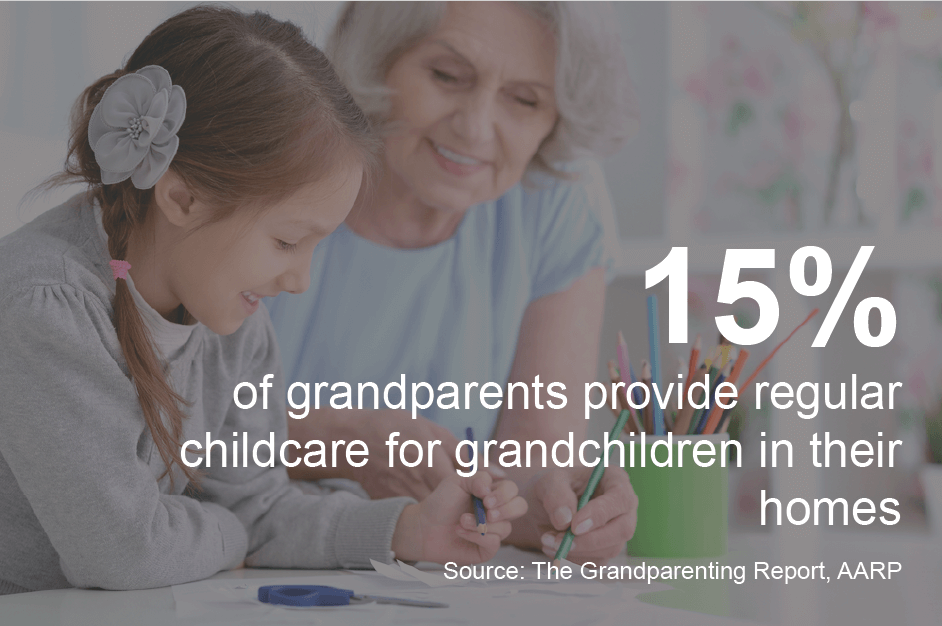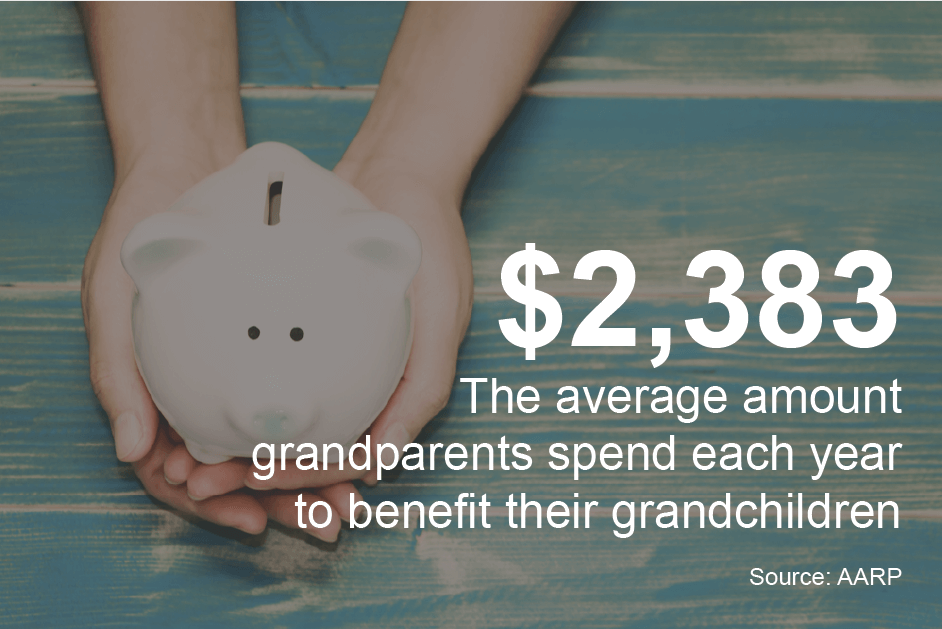Grandparenting can be a major source of fulfillment for you and your grandchild. But as with parenting, a grandparent’s role doesn’t come with a job description. Like many grandparents, you may find yourself uncertain of your role within the family.
Just as every family is different, so is the role of every grandparent. Yours will depend on your personal style and your family’s unique dynamics and circumstances as well as the needs of the present moment. You might live nearby, allowing you to be be physically active in your grandchild’s life and help with childcare. Or you might be physically apart but still provide unconditional love and support, lending an empathetic ear in times of need.
No matter the circumstances, you can find ways to be a positive force in your grandchild’s life and a helpful resource for their parents. These tips and guidelines can help you find your place and adapt to the inevitable challenges that will arise.
What Children Can Receive from Their Relationships with Grandparents
A close relationship benefits the health and well-being of both grandparent and grandchild. For grandchildren, the biggest gift of this all-important bond is the endless supply of love, acceptance, patience and unwavering support that grandparents uniquely have to offer. In healthy relationships, grandkids can find in their grandparents a safe harbor—someone they trust and know is always on their side. This extra layer of support can have lasting positive effects on the child’s emotional well-being.
What Grandparents Receive from Healthy Relationships with Grandkids
Becoming a grandparent can be life changing—an adrenaline shot that restores your energy, optimism, youthfulness and sense of purpose. Recent studies also show that emotional closeness between grandparents and grandchildren can protect against depression, boost brain function and lead to a longer life.



What is the Role of the Grandparents in the Family
How can you and your grandchild reap all the wonderful benefits of your special relationship? As a grandparent, you have many gifts to share and can be a positive influence in many ways. Here are some of the roles grandparents play along with tips on how to cultivate them:









Grandparent’s Role as a Historian
As elders, grandparents hold the key to the family’s history, and can offer grandchildren insight into their heritage that provides a sense of belonging.
- Tell stories about yourself, relatives, events and family traditions
- Share pictures, old family recipes and newspaper clips
- Plan a family history trip
- Create a family tree with pictures
Grandparent’s Role as a Nurturer
Grandparents provide a safe harbor for their grandkids, helping them feel loved and secure, which can be especially beneficial in times of difficulty or stress. Your total acceptance and loving support will be gifts your grandchildren will cherish always.
- Keep an open door
- Welcome their confidences
- Listen non-judgmentally
Grandparent’s Role as a Mentor
With their years of life experience, grandparents can serve as a loving advocate, guiding their grandchildren along the path of life. You can encourage in your grandchildren a sense of self worth that gives them a strong start and helps them rise to life’s challenges.
- Offer your encouragement
- Believe in their dreams
- Nurture their strengths
Grandparent’s Role as a Playmate
Grandparents can be a friend and fun-loving playmate in the lives of their grandchildren—and their grandchildren will love and remember them for it! Here are some ideas to connecting with grandkids at any age:
- Take the time to engage in imaginative play
- Go to the park or movies
- Enjoy the exuberant energy of your grandchildren, whatever they may be up to
Grandparent’s Role as a Role Model
Grandchildren often look up to their grandparents as worthy models for how to live life. Your good example will instill positive values for your grandchildren to emulate.Your actions speak volumes:
- About how to relate
- What’s right and what’s wrong
- What is important and what is not
Grandparent’s Role as a Spiritual Guide
This is a powerful role that can have a profound and lasting effect on your grandchild’s life. Teach your grandchildren to appreciate the qualities of compassion, tolerance, kindness, gentleness and love, and demonstrate these qualities in your own action and speech.
- Spend time together in nature
- Engage in charitable activities together
- Listen to your grandchildren’s ideas about the meaning of life
If you’re enjoying this article, the editor suggests you check out:
From Queen to Gary: What Will Your Grandchild Call You?
Grandparent’s Role as a Teacher
One of the greatest gifts that grandparents have to give is their time—time that presents the opportunity to pass on their knowledge, wisdom and life experience as well as practical skills.
- As teacher, your curriculum can be your own, but be sure anything you share about values, religion and lifestyle also aligns with their parents’ beliefs.
Grandparent’s Role as a Caregiver
Grandparents can make wonderful babysitters, and childcare is expensive, so parents will probably appreciate whatever time you have to give. For some grandparents, caregiving is a full-time job, but it’s more common for grandparents to offer care sporadically—such as when the parents have a night out or the usual childcare is unavailable.
- Caregiving = opportunity to love, teach, talk and inspire
Grandparent’s Role as a Student
While there may be much you may have to offer your grandchildren, grandparenting presents a learning opportunity for you, too.
- Grandparenting groups, classes, books and magazines can inform you of the latest childrearing developments, provide a network of support and help you learn from others.
- Pay attention to pearls of wisdom your grandchildren have to share
Working Out Your Role as a Grandparent
Many factors will come into play as you work out your grandparenting role:
- Is there a type of grandparent that you want to be? Do you naturally gravitate toward a specific role or roles?
- What kind of grandparent would the parents like you to be? What are the needs of the parents, and how can you be supportive to them?
- How much time do you realistically have to spend with your grandchildren—and how much of a presence do you want to be in their lives?
- What are you willing and able to do?
- Do you live nearby or is distance a factor? Are you trying to decide whether to move in to help with your grandchild?
- Are the family dynamics open and easy or is there conflict you need to navigate?
Talk to the parents about their ideas for your role, and share yours with them. Be clear about your choices, air any concerns and keep the lines of communication open.
As you work out your role, always remember that the parents are in charge. You may have raised your own children differently, but unless you become the primary caregiver, raising your grandchildren is the parents’ job, not yours. Abide by the rules and routines they establish for their children. Refrain from offering advice unless requested, and even then, do so with caution. Unsolicited advice can lead to family conflict that can interfere with your relationship with the parents and therefore your grandchild.
Setting Your Boundaries as a Grandparent
It’s also okay to set limits based on what and how much you want to do. You may welcome the opportunity to care for your grandchildren and happily make sacrifices upon occasion, but don’t give up other enjoyable aspects of your life because you’ve become a grandparent. If you really don’t want to babysit or commit to ongoing childcare, say so. If you end up paying for expenses, consider your own financial security and ask for reimbursement if necessary. Setting clear boundaries and practicing clear communication will help you and the parents understand one another and prevent resentments from arising.
Your Changing Role
Families change in myriad ways. Grandchildren get older and their interests and needs change. Parents have a new baby, get divorced or return to work after a family leave. Your life may change, because of work, social engagements, your health or any number of other reasons.
As a result, you may find yourself spending more or less time with your grandchildren, or providing extra support to their parents during times of difficulty or change. Be open and willing to revisit your role as circumstances evolve and to give more or less of yourself, depending on the family’s needs as well as your own.
Grandparents Are an Extra Layer of Protection
Stress and disruption are inevitable in every family’s life and can be a source of worry and distress for your grandchildren. Your presence can provide the extra buffer of care and attention they need when they’re feeling confused or uncertain.
You probably have more time and patience than busy parents do, and may offer a more objective perspective by virtue of your age and distance from the immediate family. By just being there and listening, your grandkids will feel that you’ve got their back—and that can help them move through challenges with greater resilience.
When Financial Help Is Needed
Many grandparents are also a financial safety net, helping out with everything from the grandchild’s school expenses to vacations, meals and college savings. Sometimes families need the financial assistance. At other times, grandparents are all too happy to extend their generosity because it makes them feel good, and their families (and grandchildren) appreciate it, too. Just be careful to take your own financial well-being into account.
Helping Out in Smaller Ways
You don’t need to write a check to make a difference in your grandchild’s life. Little things done with love count for a lot, like picking up your grandchildren from school, staying with them when they’re sick or taking them back-to-school shopping. They help build a bond between you and show your grandchildren you’re there for them.
Grandparenting Challenges
Grandparenting can be a joyous time of your life, but it’s not all rosy all the time for everyone. You can face some tough challenges. These are some of the family circumstances that can test your mettle and what you can do about them.
Family Conflict
Grandparenting can be complicated by past issues that put emotional distance between you and your adult children. This can mean not having the contact you wish to have with your grandchildren, which can be heartbreaking.
If you can know what caused the family breach, take some time to evaluate the circumstances and behavior, and do whatever you can to restore relations. If you were at fault, apologize. Apologize even if you weren’t at fault. Consider family counseling if parents are agreeable. If these measures don’t help, the problem may be beyond your control, but do what you can to stay in touch in a non-obtrusive way. Spend whatever time you can with your grandchildren, and send them cards and letters to keep your relationship alive. Let your good intentions be known. Your relationships may repair with time.
Two Different Worlds
Parents and children of today face a very different world than those of the previous generation. Childrearing methods have evolved, and research and new technologies have brought changes to how things are done. For example, babies are put to sleep on their backs, car seats are required by law and smoking around children is strongly discouraged. To freshen up your skills and knowledge, attend a grandparenting class, have a conversation with a pediatrician, or read books and magazines on the topic.
Physical distance
It’s a fact of modern-day life: families can live hundreds or thousands of miles away from each other and visit in person only on holidays or vacations. But even if you’re a long-distance grandparent, technology can help you remain close to your grandchildren. Videoconferencing, email and social media are next-best options to being together in person.
Divorce
When parents divorce, it can take time for everyone to adjust. Grandparents can be an emotional sanctuary, offering support to their adult child and the care their grandkids need in a difficult time. If your family is going through a divorce, here are some important tips:
- Be there to lend a sympathetic ear and offer practical day-to-day help, such as babysitting, grocery shopping or cooking a meal.
- Keep up your usual schedule with your grandchildren. Share fun activities they enjoy. Gently ask about any emotions or fears they may be having, but don’t force the subject. Simply letting them know you’re always there if they need to talk can be reassuring.
- Remain neutral. It’s normal for you to take sides, but taking sides is not helpful for your grandchildren. Encourage their love of both parents.
- If your ex-in-law prevents you from seeing your grandchildren, some states allow you to petition the court for visitation rights. Unfortunately, though, such cases are often not successful and their adversarial nature can further strain family relationships.
Grandparents Raising Their Grandchildren
Some grandparents end up raising their grandchildren. This situation may be due to the natural parent’s death, disease or disability, addiction, job situation, mental instability, or incarceration. Custodial grandparenting, when grandparents assume full-time responsibility for their grandchildren, probably presents the most difficult form of grandparenting. The grandchildren are missing out on a relationship with their parents as well as a normal relationship with their grandparents. There may also be legal and financial issues, and emotional strain for both grandparents and grandchild.
What Are the Grandparent’s Responsibilities?
Unless you’re invited to assume parenting responsibilities, it’s always important to remember that the parents are in charge and to respect their decisions and guidelines even if you don’t agree with them. However, there are some times when it’s appropriate to intervene.
- Abusive situation—It’s vital that you step in. Talk to the parents. And if your grandchild is in danger, consider contacting the police or your state’s child protective services department. Most states also have a toll-free number you can call to report abuse and get help for the family.
- Unhealthy relationship patterns—For example, a parent belittling your grandchild or making disparaging comments. Your grandchild needs kind reassurance and perspective, and the parent needs to understand the damage they are causing. If it’s a chronic thing, encourage the parent to get counseling help.
- Child’s habits—If you’re concerned about the child’s habits, such as foods, screen time, or bedtimes, it’s fine to talk about them with the parents. But remember, they still have the final say.
Additionally, it’s fine for you to take matters into your own hands if the child’s:
- Parents say you can or are not present
- Behavior directly affects you
- Safety is at stake
- Breaking the rules of your house
Grandparenting Safety Video
Being a grandparent is a wonderful experience, but also a huge responsibility. From sleeping arrangements to baby monitors, there are a lot safety precautions to consider. Learn about some of the key safety measures you should take if a little one is staying at your home in this animated video.
Guidelines on Effective Discipline for Grandparents
The American Academy of Pediatrics recommends these guidelines for disciplining your grandchild:
- Establish a positive, supporting and loving relationship with your grandchildren. Otherwise, they’ll have no reason other than fear to demonstrate good behavior.
- Use positive reinforcement to increase the behavior you want from your grandchildren. Praise them when they do the right thing.
- Use clear language and an even tone. Keep your cool even if your grandchild has a temper tantrum.
- Be patient. Your grandchild’s behavior may not change overnight.
- If you feel discipline is necessary, avoid physical punishment such as spanking, which can teach aggressive behavior and anger. Instead, use time-outs for young children and temporarily remove favorite privileges, such as TV time, for older children.
Standard House Rules
When your grandchildren are at home, the parents’ house rules apply. When they’re visiting you, your house rules are the ones to follow. Just make sure your rules are not too restrictive or your family might not want to visit. It’s entirely reasonable to ask your grandkids to keep their shoes off the furniture, and not run, shout, fight or slam doors in the house.
Grandparenting is a journey of love—one that requires your flexibility, adaptability, patience and commitment. As with parenting, it’s unlikely you’ll ever be perfect, but the ability to recognize the possibilities and challenges and make thoughtful decisions along the way can make it rewarding and fulfilling for everyone.
Grandparent Reflection:
Now that you’re enjoying grandparenthood, take a moment…think
back to the relationship you had with your grandparent’s. How does it
compare to the role you play with your grandchildren? Is it different?
The same?
Let us know. Join the discussion and leave a comment below.











I am struggling balancing my mom and my kids. We are living with her temporarily to both help her and until I am able to get a place of our own. She clashes with two of my three kids over everything and it’s getting unbearable. There is a constant battle between who is right and wrong but the issue is the conflict always occurs when I’m not around. My mom expects to me believe her and take her side yet my kids are not always in the wrong. With my moms failing health I have witnessed blatant lies from my mom and also can tell that my kids are not 100 honest either. What do I do?????
What if your Grandchildren are doing things you don’t like? What if their attitude is leave me alone and I can do it all by myself?
Relationship is a two way street. I can’t love them regardless of what they do. They lack experience and knowledge about life. Hate to watch them make irreversible mistakes and suffer consequences rest of their lives⁉️
I’m a grandma to two local grandkids but anyways I’m 53 and was diagnosed with Dementia and drivers license taken away! That makes it really hard to take the grandkids anywhere or do anything with just them and me!!! My daughter for some reason won’t let me even go eat lunch with my granddaughter at school or do any back to school shopping with them! I used to babysit my granddaughter, she would stay with me a week at a time, do all the fun summer things, and now her mom ( my daughter just won’t allow it)! It just kills me! I live by myself and I’m still alive, haven’t burnt down the house, i can’t get get a lunch date without my daughter! I’m having a horrible horrible time with it all!
Wonderful memories of grandma
Unfortunately I don’t have that with my 3 grands. Parents ‘private’ people. Hard getting family info
Re daily or happy, sad happenings.
Try texting to plan gettogethers
Told too busy
OMG this made me cringe and my eyes watery. I’m so sorry you are being pushed aside and your feelings neglected. Im a grandma, a young one, and my daughter expects me to be a certain way. I’m not. I’m a career woman and still very young at heart. We don’t get along. But im sure to be the one to reach out for my grandchild whether im ignored or not. Yet still, it’s painful to be an outsider to your own DNA. From the bottom of my heart…im sorry.
I’m so sorry!! I feel for you so much!
This is a great article! There are so many pearls of wisdom offered to grandparents or soon to be grandparents. We have purpose. Ms. Simpson has pointed out so many areas for each of us to do the right thing. Let’s make sure we give the best support to our grandchildren.
This is a wonderful article. I especially loved that explanation of the different roles grandparents play in the lives of their grandchildren. That bond is so important and life changing. This article really opened my eyes to the benefits of the grandparent/grandchild bond.
was excellent recomendation for grandpaent.Thank you
‘To ride, shoot straight, and speak the truth; this was the ancient law of youth. Old times are past, old days are done. But the law runs true, my little son!’. ‘Nuff said.
Loved this article. We do a lot of your recommendations right and can work on others 🙂 We love our grandkids. Thank you for all of this valuable information.
Would LOVE to have this in PRINTED COPY format. This is an excellent reference. Thank you for such a complete and well rounded treatment of our privileges as grandparents.
I thought this was an awesome “definition” of a grand parenting…quite thorough. I have a wonderful friend who is attending a ministry conference in Oregon on this topic with whom I shared the article. I love my role as grandparent and believe it is a great way to be a disciple.